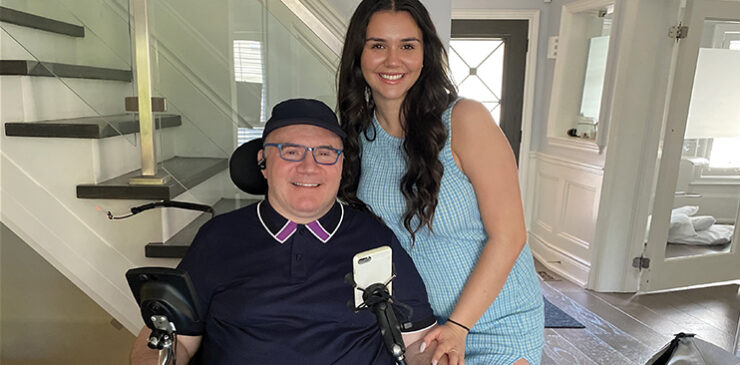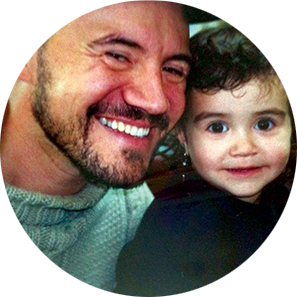Julia Candido is a Journalism student in her final year of her Master’s degree at Toronto Metropolitan University. With a passion for dance, travel, broadcasting and exploration, she loves to tell stories in order to derive their deeper meaning.
In her final year of high school, Julia’s father, Reno Candido sustained a spinal cord injury that would alter his life and that of his family. “It was right after Christmas and my mom had called saying my dad is in the hospital after a slip and fall. An SCI never crossed my mind,” she shares.
“We don’t talk often enough about the impact that an SCI has on the family’s mental health as a whole,” says Julia, “But at times it can take a toll on you. It is a very challenging thing to process with lots of emotions and many unknowns. Every day was so different and unstable, and nobody knew whether things would get better or worse. I will never forget when I first saw my dad after surgery, unable to move and connected to so many machines. It’s difficult to see your parent like that. I ran out of the hospital crying.”
“As a young person experiencing this, it’s hard, but my advice to children of those who have sustained an SCI is to take it one day at a time. You’ll have good days and bad days, but don’t suppress things. There are people willing to listen to you and others who are in similar situations that you can connect with,”
-Julia Candido
For Julia, witnessing her father’s vulnerable state was challenging enough, but paired with the pressure of her final year of high school and plans for university, she relied on the support of her teachers, guidance counsellors and friends. “The first step in healing for me was not being afraid to ask for help,” she shares. “I would leave class sometimes just to talk to my counsellor about all the emotions I was feeling and processing. It helped to hear from someone who wasn’t a friend or family member.”
Julia also shares the important role that accommodations played in that vital year of her studies when the pressure of performing well was high. “I had extensions granted for major assignments and did not have to complete exams, so that was helpful because it was a very difficult time.”
While she initially planned to study in London, Ontario, seeing her dad’s health condition made her re-evaluate and make the decision to stay closer to home by choosing McMaster University for her undergrad studies. “It was a good compromise because I still went away for school as I had planned, but I was close enough to home to be there for my family. Spending time with my dad was very important for me,” she says.
Julia touches on the systemic barriers that she learned about as time went on following her father’s injury. “There is the initial shock of seeing your dad in a wheelchair for the first time. There is also the feeling of grief for the way you were used to seeing him, walking around and being self-sufficient. Then there are the additional challenges you learn about, like home care. Nurses and PSWs are heavily relied on, so seeing the gaps in that and the stress it caused for my mom was eye-opening and frustrating. Having care at home allows someone to keep their dignity without having family members or spouses step in.
But this is challenging to maintain in snowstorms for example. So much of the family’s life is dependent on someone else.”
She further shares that although the person going through the SCI is likely feeling even heavier emotions, it is important for family members to talk about their mental health as well in order to address their grief and anger and get on a path toward healing.
“As a young person experiencing this, it’s hard, but my advice to children of those who have sustained an SCI is to take it one day at a time. You’ll have good days and bad days, but don’t suppress things. There are people willing to listen to you and others who are in similar situations that you can connect with,” she says.
She reflects on learning about SCIO and hearing the stories of peers like Chris Stigas, which made her experience feel more relatable, to hear someone having gone through something similar and express similar struggles within the healthcare system. It also gave her a sense of hope and optimism that hopefully one day we would be able to see change.
“Of course, there are still difficult thoughts that come and go. It’s okay to have sad thoughts, but it’s important to acknowledge them and feel all the emotions. I also believe that practicing gratitude is very important, I remind myself every day to be thankful for the blessing that I do have. My dad is alive and here with me to celebrate everything that happens in life and for that, I am extremely grateful. When things get difficult, I manage my mental health by pouring myself into work I am passionate about. I write a lot too as I’ve gotten older and I find it therapeutic to put my feelings on a page and to tell the story of my dad’s injury and how we got through it as a family. I also find passion in writing about the inequities within the system, with the hopes that one day there will be change.”







